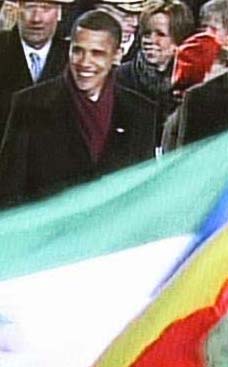
"Time is short. The latest science suggests that the impacts of climate change are occurring faster than expected. While there is no large scale model in existence for a fair and effective carbon tax, cap and trade programs for carbon dioxide (CO2) are already the policy instruments of choice around the world and in the United States. Over time these programs could be linked to establish a single comparable global carbon market. This would expand the environmental benefits and lower costs for emitters. A tax is unlikely to yield such an outcome. " Jonathon Lash, President of the World Resources Institute, served as a Peace Corps Volunteer in the Dominican Republic.
Jonathan Lash writes: Cap or Tax Carbon Emissions?
Cap or Tax Carbon Emissions?
By Jonathan Lash, president, World Resources Institute
February 04, 2009
Mongabay does not normally publish statements from environmental groups on climate policy matters, but this recent post from World Resources Institute preisdent Jonathan Lash is an exception.
Debate is raging about the relative merits of a carbon tax or a cap and trade system as the centerpiece of federal legislation to reduce emissions that fuel global warming. Here is why cap and trade must be the U.S. policy instrument of choice.
Q: WRI supports a cap and trade program over a carbon tax. Why?
The objective of federal climate legislation is to control emissions of greenhouse gases. This will require Congress to put a price on carbon using one of two options: by mandating a specific price on carbon, via a tax; or by setting a carbon emissions limit—a cap—and enabling businesses to trade allowances to discharge emissions. With a carbon tax, there is little evidence that we could get the price right to begin with, and even less to suggest that Congress would be willing to raise the tax regularly in order to keep emission levels falling. In addition, the actual quantity of reductions that could be achieved through a tax would be unknown in advance.
WRI therefore believes the most effective way to control greenhouse gases is through a cap and trade mechanism that is designed to guarantee steady emissions reductions, encourage innovation, and ensure a measure of fairness to low income consumers and coal dependent regions. A blueprint for such a mechanism was recently submitted to Congress by the US Climate Action Partnership (USCAP), a coalition of 26 corporations and five environmental groups, including WRI. (see www.us-cap.org).
Q: Some are arguing that a carbon tax would be simpler and fairer. What’s your response?
That notion may work in theory, but won’t work in practice. The “simple” tax and rebate that people talk about would in fact create huge regional unfairness - moving money from states that use a lot of coal to generate electricity to non-coal states. Such a tax would never pass the Senate. Efforts to ensure fairness would also create a lot of complexity and opportunities for loopholes. You would have to love the IRS code to believe a tax would be fair and simple.
Q: Why not consider all policy options?
Time is short. The latest science suggests that the impacts of climate change are occurring faster than expected. While there is no large scale model in existence for a fair and effective carbon tax, cap and trade programs for carbon dioxide (CO2) are already the policy instruments of choice around the world and in the United States. Over time these programs could be linked to establish a single comparable global carbon market. This would expand the environmental benefits and lower costs for emitters. A tax is unlikely to yield such an outcome.
Q: What about the argument that emissions trading does not work in practice?
Untrue. Emissions trading systems deliver what they are set up to do. The US acid rain program employed a sulfur emissions cap and trade system and successfully produced a 50 percent cut in emissions - at much lower cost and greater efficiency than predicted. The first phase of the EU trading system was over supplied with allowances due to a lack of data available to governments, and therefore early emissions cuts were not as big as they might have been. There was no design error in the system itself. Three US regions are already implementing successfully, or designing, cap and trade programs for CO2. Europe has a cap, and Australia soon will.
Q: What about the economic crisis? Won’t a carbon cap be bad for already struggling businesses?
Trading systems adjust automatically during market downturns, and carbon trading would be no exception. In just the same way that other commodities prices are dropping, demand for carbon allowances would decline during a recession and therefore prices would fall. Achieving the same result under a carbon tax approach would require government to intervene to lower the tax rate temporarily, which would be more complicated and produce a less desirable long term environmental outcome.
Q: Might a cap and trade system lead to another market failure?
We know that markets can be gamed, and that fraud and false information undermine their efficiency. That is true in commodity markets, equity markets, and credit markets, and will be true in carbon markets. The answer is effective regulation, not elimination of markets. The USCAP blueprint, for example, would create a regulatory system designed to protect against abuse.













